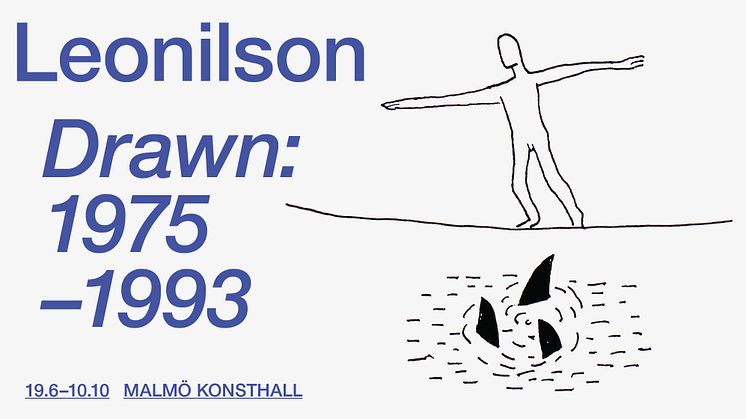
Pressmeddelande -
Personal and political struggles become one in the exhibition with Leonilson at Malmö Konsthall
The poetic and autobiographical artistry of José Leonilson is considered one of the most important to emerge from the collapse of the Brazilian dictatorship in 1985. The first major European retrospective of the artist, who died of AIDS in 1993, will now be shown at Malmö Konsthall. In an intimate and direct form Leonilson depicted homosexuality, gender stereotypes, the feeling of being an outsider, and the enormous divide between the poor and the affluent in Brazilian society.
Leonilson – Drawn: 1975–1993
Malmö Konsthall 19.6 – 10.10/21
Curator: Krist Gruijthuijsen. Assistant Curator: Léon Kruijswijk
José Leonilson created his personal and poetic vision in times of political and social change in his native Brazil. This exhibition Leonilson – Drawn: 1975–1993 is the first major retrospective of his work in Europe and presents a selection of 250 works, from his early paintings to the late introspective embroidery, created after he was diagnosed with AIDS, a disease untreatable at the time.
José Leonilson (1957–1993) was one of the most important members of the generation of Brazilian artists that was referred to as the Geração 80 (Generation 80). After the collapse of the military dictatorship in Brazil in 1985 twenty years of repression and restrictions of expression came to an end.The Geração 80 celebrated their newly won freedom by painting in a colourful, expressive style, underlined by social criticism. The work by Leonilson became some of the most significant to emerge from Brazil at this point in time, and he is currently represented in over 500 collections worldwide. The power of his imagery, his strong personality and assertive attitude has influenced many artists who followed. Leonilson was an engaged individual, a dedicated citizen of the world, committed to his place in time.
“The unique work by Leonilson confronts our inner emotional life as human beings and issues concerning the human body in a surprisingly extensive production – despite the artist’s untimely AIDS-related death. In this exhibition, Malmö Konsthall offers an international perspective to significant political and historical events in our time through the eyes of an artist,” says Mats Stjernstedt, Head of Malmö Konsthall.

Leonilson studied art in São Paulo (1978–1981) but chose to abandon his studies to develop his art independently. The Italian neo-expressionist movement, Transavanguardia, that favoured ancient mythology and figurative painting was a strong influence on his work. And artists like Eva Hesse, Blinky Palermo, and Paul Klee would also have a great impact on his creative efforts. There are tell-tale signs of what would come to characterise Leonilson’s oeuvre even in the early juvenile works made prior to his art studies: an activity in which ideas and materials were sourced in everyday experience, and transformed into subtly poetic art objects strongly informed by the artist’s personal relationships, particularly his romantic engagements with other men.
In Leonilson's work, the personal and the political merged. Being the son of a religious family from the impoverished northeast region of Brazil, he suffered injustice because of the colour of his skin and his sexual orientation. Through his work, he depicted being an outcast, being a gay man, being a minority, and published photographs and drawings of individuals who belonged to marginalized groups that he felt a kinship with. Many of his art works express an unmistakable critique of conventional gender constructs, gender stereotypes, and the enormous divide between the poor and the affluent in Brazilian society. Simultaneously, his work is poetic, vulnerable and intimate, filled with emotions and ambiguity, often including written elements. ”I don't express myself with violence, or using power. I believe small, quiet things pierce you as sharply as a bullet in the head”, reads a quote from the artist.
When Leonilson was diagnosed with AIDS in 1991, his visual idiom changed significantly. Between 1991 and 1993, when he passed away as a result of the disease, the deterioration of his health can be traced through his work, almost like reading a journal. Towards the end of his life, he worked mostlyin small format with needle, thread, and fabric, because of the physical toil that his condition took on him, and because he could not bear the smell of paint anymore. During this final phase, language and abstraction, as well as the visual and formal languages of religion, played a vital part in his work.

Through the recent Covid-19 pandemic we have been reminded that it is often the marginalized groups in a society who are simultaneously the most severely effected by the spread of a disease and most at risk of being scapegoated for its proliferation. Throughout the exhibition period, Malmö Konsthall will shed light on how the AIDS epidemic effected the LGBTQI communities of Malmö and Sweden at the time, through a collaboration with Positiva Gruppen Syd (the Positive Group South). The exhibition is shown at Malmö Konsthall as part of World Pride 2021 in Malmö and Copenhagen.
Leonilson – Drawn: 1975–1993 gives an overview of Leonilson’s entire oeuvre, and covers a wide range of expressions and styles; drawings, paintings, sculptures and embroideries. The exhibition was compiled at the KW Institute for Contemporary Art, Berlin, by curator Krist Gruijthuijsen. The Malmö edition of the exhibition was produced in collaboration with Moderna Museet in Stockholm and Malmö Konsthall.
"For many years now, we have tried to cultivate conditions to show Leonilson’s personal, earnest, and striking artistry. Drawn 1975–1993 was planned to be shown at the Moderna Museet in Stockholm this spring; however, the Corona-pandemic prevented the exhibition from opening. We are very happy to be able to contribute to this important voice meeting the Swedish audience at Malmö Konsthall,” says Fredrik Liew, Curator of the Modern Museet.
The exhibition Leonilson – Drawn: 1975–1993 is produced by KW Institute for Contemporary Art, Berlin, in collaboration with Moderna Museet, Malmö Konsthall, and the Serralves Foundation – Museum of Contemporary Art, Porto. The exhibition Leonilson: Drawn 1975–1993 was made possible by support from the German Federal Cultural Foundation.
The exhibition is part of Öppna Malmö, Malmö city’s initiative to promote awareness about discrimination and racism, which runs from 2020 to 2022. We would like to express our sincere gratitude to our partners KW Institute for Contemporary Art, and Moderna Museet, Stockholm.
Press conference (in Swedish)
Thursday June 17th at 11–11.45 am via Zoom: https://zoom.us/j/94806314084
Present: Mats Stjernstedt, director of Malmö Konsthall, Fredrik Liew, curator of the Moderna Museet, and Sarah Hirani, who will present an additional exhibition: Antirasistiska blickar (Anti-Racist Gazes). Journalists are then welcome to visit the exhibition between 1 and 4 pm.
Opening
Digital opening, via Facebook Live, on Friday June 18th at 6–6.30 pm. Open to the public from Saturday June 19th.
Press images
Password ”press2021”
For more information:
Heidi Hakala
Communications manager
Heidimatilda.hakala@malmo.se
+46 (0)70 149 3019

José Leonilson, Vogue Ideal (fanzine), 1976. Marker, ballpoint pen, and graphic on paper. Private collection, São Paulo. Photo: Rubens Chiri
Malmö Konsthall är ett av Sveriges största rum för aktuell och reflekterande samtidskonst. Sedan 1975 har konsthallen visat hundratals utställningar med regional, nationell och internationell prägel och lockar årligen närmare 200.000 besökare.

